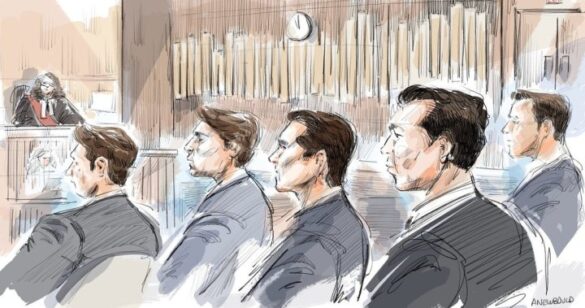On May 16, 2025, the sexual assault trial involving five former members of Canada’s 2018 World Junior hockey team took a significant turn when Ontario Superior Court Justice Maria Carroccia dismissed the jury due to concerns over potential bias. The accused—Michael McLeod, Carter Hart, Alex Formenton, Dillon Dubé, and Cal Foote—stand accused of group sexual assault at a London, Ontario hotel in June 2018. Following the jury’s discharge, the trial will proceed as a judge-alone case to ensure fairness and prevent further delays, with Justice Carroccia set to determine the verdict based on the evidence and testimonies presented.
The decision by Justice Maria Carroccia to dismiss the jury marks a pivotal moment in the ongoing trial that has drawn significant public and media attention. Concerns about potential bias arose after indications that some jurors may have been influenced by pretrial publicity surrounding the case. This development underscores the complexities courts face in high-profile cases where extensive media coverage can impact juror impartiality.
Background of the Case
The five former players—Michael McLeod, Carter Hart, Alex Formenton, Dillon Dubé, and Cal Foote—were charged with group sexual assault related to an incident alleged to have occurred in June 2018 at a hotel in London, Ontario. The accusations stem from an event shortly after their participation in the World Junior Hockey Championship, a tournament where they represented Canada. The trial, which commenced earlier in 2025, has involved detailed testimonies, including those of the complainant, the accused, and various witnesses.
Reasoning Behind Jury Dismissal
Justice Carroccia emphasized the importance of an unbiased and fair trial process in her ruling. She noted that while juries are generally the preferred method for fact-finding in criminal cases, in this instance, the risk of compromised impartiality due to external influences warranted the transition to a judge-alone trial. The judge highlighted that this approach would ensure that the verdict is grounded solely in the evidence and legal arguments presented in court.
Next Steps in the Trial
With the jury discharged, the trial will continue under the judge-alone format, wherein Justice Carroccia will assess all evidence and testimonies before delivering a verdict. This procedural adjustment aims to minimize delays and maintain the integrity of the judicial process. Legal experts note that judge-alone trials in Canada are rare in high-profile sexual assault cases but are permitted when fairness is at risk.
Legal and Public Response
The prosecuting and defense teams have expressed their respect for the court’s decision. The Crown prosecution has reiterated its commitment to pursuing justice for the complainant, while the defense attorneys have welcomed the decision, citing concerns about prejudicial media influence on potential jurors. Public reactions remain mixed, with advocates emphasizing the need for a fair and thorough examination of the facts and the accused’s right to a just trial.
Context and Implications
This case highlights ongoing challenges in the judicial system concerning high-profile criminal trials and media influence. It raises important questions about balancing transparency, public interest, and the rights of the accused. Observers note that the outcome of this trial may have broader implications for how future cases of this nature are managed in the Canadian legal context.
The trial is expected to proceed in the coming weeks, with Justice Carroccia scheduled to hear further arguments and evidence before reaching a decision. Given the sensitive nature of the case and its potential impact on the reputations of the individuals involved, the court will continue to manage proceedings with careful attention to fairness and procedural integrity.
The dismissal of the jury and transition to a judge-alone trial in the sexual assault case involving former members of Canada’s 2018 World Junior hockey team underscores the complexities of ensuring impartiality in high-profile legal proceedings. Justice Maria Carroccia’s decision aims to safeguard the fairness of the trial by mitigating the influence of external factors such as media coverage. As the trial moves forward under this adjusted format, the focus remains on a thorough and unbiased evaluation of the evidence and testimonies. The outcome of this case will not only affect the lives of the accused and the complainant but may also influence future approaches to managing media-sensitive criminal trials within the Canadian judicial system.

